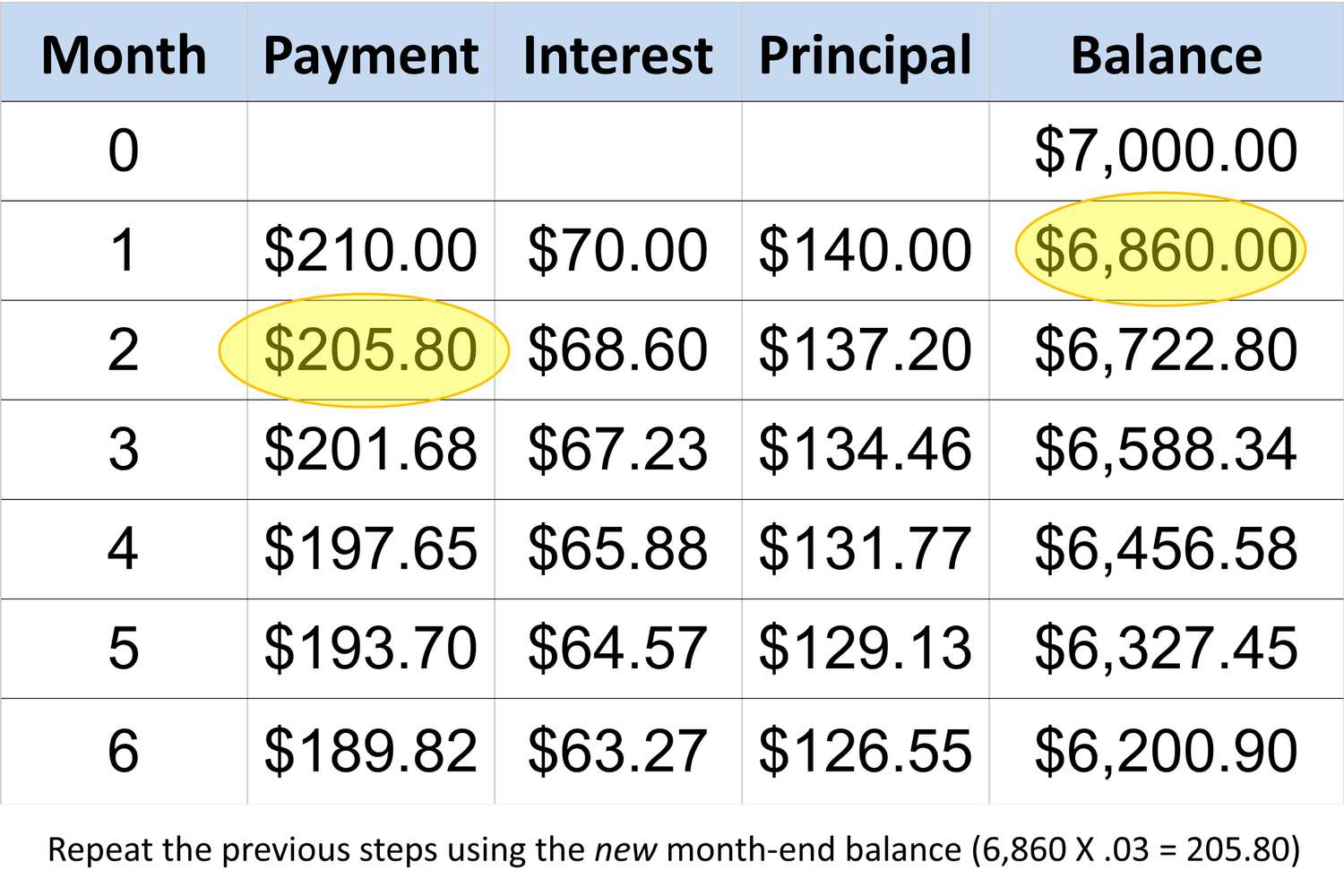Home>Finance>What Small Business Credit Cards Do Not Require A Minimum Payment Due Every Month?


Finance
What Small Business Credit Cards Do Not Require A Minimum Payment Due Every Month?
Published: February 27, 2024
Discover small business credit cards that don't require a minimum monthly payment. Explore flexible finance options for your business today.
(Many of the links in this article redirect to a specific reviewed product. Your purchase of these products through affiliate links helps to generate commission for LiveWell, at no extra cost. Learn more)
Table of Contents
Introduction
Small business owners often rely on credit cards to manage their day-to-day expenses and cash flow. However, the requirement of a minimum payment due every month can pose a challenge, especially during lean months when revenue may be lower than expected. In such cases, small business owners may seek credit card options that offer more flexibility in terms of minimum payment requirements.
In this article, we will explore the world of small business credit cards and specifically focus on those that do not mandate a minimum payment due every month. We will delve into the benefits and drawbacks of such cards, as well as provide insights on how to choose the right small business credit card to suit specific business needs. Additionally, we will highlight the key features and considerations that small business owners should keep in mind when evaluating credit card options.
By the end of this article, small business owners will have a clearer understanding of the available credit card choices that align with their financial requirements and provide the necessary flexibility to manage their cash flow effectively. Whether it's the desire for a buffer during challenging months or the need for greater financial control, the information presented here will empower small business owners to make informed decisions regarding their credit card selection.
Understanding Small Business Credit Cards
Small business credit cards are financial tools designed to cater to the specific needs of entrepreneurs and business owners. They offer a convenient means of managing business expenses, providing a dedicated line of credit separate from personal finances. These cards often come with features tailored to business requirements, such as expense tracking, employee spending limits, and rewards programs geared towards business-related purchases.
Unlike personal credit cards, small business credit cards are intended for commercial use, allowing business owners to keep their business and personal expenses separate. This demarcation streamlines accounting processes and simplifies tax preparation, offering a clear delineation between personal and business finances.
Moreover, small business credit cards often provide access to higher credit limits compared to personal credit cards, enabling entrepreneurs to make larger purchases and manage fluctuating cash flow more effectively. This flexibility can be particularly advantageous during periods of expansion, when significant investments may be necessary to drive business growth.
Understanding the nuances of small business credit cards is essential for entrepreneurs seeking to leverage these financial tools to their advantage. By comprehending the distinct benefits and features offered by these cards, business owners can make informed decisions when selecting the most suitable credit card for their specific needs.
Small Business Credit Cards with No Minimum Payment Due
While many credit cards require a minimum payment to be made each month, there are options available for small business owners that offer more flexibility in this regard. Some small business credit cards do not mandate a minimum payment due every month, providing entrepreneurs with greater control over their cash flow and financial obligations.
These cards typically offer a grace period within which the full balance can be paid without incurring interest charges or penalties. This feature can be particularly beneficial for business owners during months when cash flow may be constrained, as it allows for the management of expenses without the added pressure of meeting a minimum payment requirement.
Small business credit cards with no minimum payment due offer a degree of financial breathing room, enabling entrepreneurs to navigate through lean periods without the burden of fixed monthly payments. This flexibility aligns with the unpredictable nature of business revenue, providing a safety net for managing cash flow fluctuations.
It’s important for small business owners to carefully review the terms and conditions of such credit cards, ensuring they understand the implications of not having a minimum payment due every month. While this feature can offer valuable flexibility, it’s essential to assess the overall cost of credit, including interest rates and other fees, to make an informed decision that aligns with the business’s financial strategy.
By exploring small business credit cards with no minimum payment due, entrepreneurs can identify options that complement their financial needs and provide the necessary flexibility to navigate the dynamic landscape of business operations.
Benefits and Drawbacks of Small Business Credit Cards without Minimum Payment Due
Small business credit cards that do not require a minimum payment every month offer several advantages for entrepreneurs. One of the primary benefits is the enhanced flexibility in managing cash flow, especially during periods of fluctuating revenue. This feature can be particularly valuable for businesses with seasonal income variations or those navigating through challenging economic conditions.
Furthermore, these credit cards often provide a grace period for making payments, allowing business owners to allocate funds strategically without the pressure of meeting fixed monthly obligations. This can contribute to improved financial planning and the effective allocation of resources within the business.
Additionally, small business credit cards without a minimum payment due every month can serve as a valuable financial buffer, offering entrepreneurs the freedom to prioritize essential business expenses while maintaining the option to pay the full balance within the grace period.
However, it’s important to consider the potential drawbacks associated with such credit cards. While the absence of a minimum payment requirement offers flexibility, it may also lead to the accumulation of higher interest charges if the full balance is not paid within the grace period. Business owners should exercise prudent financial management to avoid accruing excessive interest costs.
Moreover, the absence of a minimum payment due every month may result in a reduced sense of financial discipline for some entrepreneurs. Without a fixed monthly obligation, there is a risk of procrastinating payments, potentially leading to increased interest expenses and financial strain in the long run.
By carefully weighing the benefits and drawbacks of small business credit cards without a minimum payment due every month, entrepreneurs can make informed decisions that align with their business’s financial objectives and cash flow management strategies.
How to Choose the Right Small Business Credit Card for Your Needs
When selecting a small business credit card, it’s essential for entrepreneurs to consider several key factors to ensure that the chosen card aligns with their business’s financial requirements and objectives.
1. Assess Your Business’s Spending Patterns: Evaluate the predominant categories of business expenses to determine which credit card features, such as rewards and cashback programs, would offer the most value based on your spending patterns.
2. Consider Flexibility in Payment Requirements: If the absence of a minimum payment due every month is a priority for your business, explore credit card options that provide a grace period and flexibility in managing monthly payments without incurring penalties.
3. Review Interest Rates and Fees: Carefully examine the annual percentage rate (APR) and associated fees, ensuring that the overall cost of credit aligns with your business’s financial strategy. Compare offers from different providers to identify the most competitive terms.
4. Evaluate Rewards and Benefits: Look for credit cards that offer rewards, bonuses, or cashback on business-related expenses, such as office supplies, travel, and advertising. These perks can contribute to cost savings and enhance the overall value of the card.
5. Analyze Introductory Offers: Some credit cards may feature introductory offers, including 0% APR periods or bonus rewards for initial spending. Assess these offers in the context of your business’s short-term financial needs and cash flow projections.
6. Consider Reporting and Expense Management Tools: Explore credit cards that provide robust reporting and expense management tools, facilitating streamlined accounting processes and simplifying the tracking of business expenditures.
7. Seek Business-Specific Benefits: Look for features tailored to business needs, such as employee spending limits, the ability to issue multiple cards for staff, and integration with accounting software for efficient financial management.
By carefully evaluating these factors and aligning them with your business’s financial priorities, you can choose a small business credit card that optimally supports your operational requirements and contributes to effective cash flow management.
Conclusion
Small business credit cards play a pivotal role in providing entrepreneurs with the financial flexibility and resources necessary to navigate the complexities of running a business. For many small business owners, the requirement of a minimum payment due every month can present challenges, particularly during periods of fluctuating revenue and economic uncertainty.
Exploring small business credit cards that do not mandate a minimum payment due every month offers a viable solution for managing cash flow with greater flexibility. These cards provide entrepreneurs with the ability to strategically allocate funds, prioritize essential expenses, and navigate through lean months without the added pressure of fixed monthly payments.
While the absence of a minimum payment requirement offers valuable flexibility, it’s essential for business owners to exercise prudent financial management and carefully assess the overall cost of credit, including interest rates and associated fees. By doing so, entrepreneurs can leverage the benefits of these credit cards while mitigating potential drawbacks.
When choosing a small business credit card, it’s crucial to consider the specific needs of your business, including spending patterns, financial objectives, and operational requirements. By evaluating factors such as rewards programs, interest rates, payment flexibility, and business-specific benefits, entrepreneurs can select a credit card that aligns with their financial strategy and contributes to effective cash flow management.
In conclusion, small business credit cards that do not require a minimum payment due every month offer a valuable financial tool for entrepreneurs seeking greater control over their business expenses and cash flow. By understanding the nuances of these credit cards and aligning their features with business priorities, small business owners can make informed decisions that support their long-term financial success.














